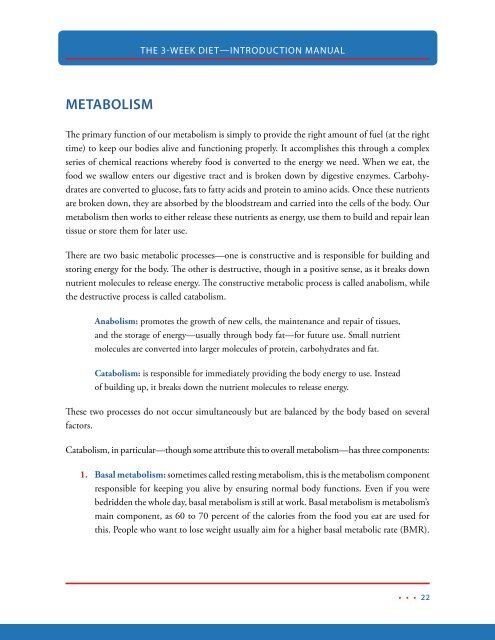3-WEEK DIET
You also want an ePaper? Increase the reach of your titles
YUMPU automatically turns print PDFs into web optimized ePapers that Google loves.
THE 3-<strong>WEEK</strong> <strong>DIET</strong>—INTRODUCTION MANUAL<br />
METABOLISM<br />
The primary function of our metabolism is simply to provide the right amount of fuel (at the right<br />
time) to keep our bodies alive and functioning properly. It accomplishes this through a complex<br />
series of chemical reactions whereby food is converted to the energy we need. When we eat, the<br />
food we swallow enters our digestive tract and is broken down by digestive enzymes. Carbohydrates<br />
are converted to glucose, fats to fatty acids and protein to amino acids. Once these nutrients<br />
are broken down, they are absorbed by the bloodstream and carried into the cells of the body. Our<br />
metabolism then works to either release these nutrients as energy, use them to build and repair lean<br />
tissue or store them for later use.<br />
There are two basic metabolic processes—one is constructive and is responsible for building and<br />
storing energy for the body. The other is destructive, though in a positive sense, as it breaks down<br />
nutrient molecules to release energy. The constructive metabolic process is called anabolism, while<br />
the destructive process is called catabolism.<br />
Anabolism: promotes the growth of new cells, the maintenance and repair of tissues,<br />
and the storage of energy—usually through body fat—for future use. Small nutrient<br />
molecules are converted into larger molecules of protein, carbohydrates and fat.<br />
Catabolism: is responsible for immediately providing the body energy to use. Instead<br />
of building up, it breaks down the nutrient molecules to release energy.<br />
These two processes do not occur simultaneously but are balanced by the body based on several<br />
factors.<br />
Catabolism, in particular—though some attribute this to overall metabolism—has three components:<br />
1. Basal metabolism: sometimes called resting metabolism, this is the metabolism component<br />
responsible for keeping you alive by ensuring normal body functions. Even if you were<br />
bedridden the whole day, basal metabolism is still at work. Basal metabolism is metabolism’s<br />
main component, as 60 to 70 percent of the calories from the food you eat are used for<br />
this. People who want to lose weight usually aim for a higher basal metabolic rate (BMR).<br />
22



